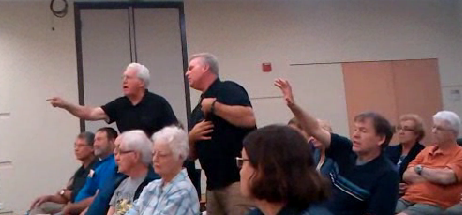 What a southwest suburban library had promoted as an educational forum this week on Muslim life in America quickly turned into a contentious debate about Islam.
What a southwest suburban library had promoted as an educational forum this week on Muslim life in America quickly turned into a contentious debate about Islam.
The tone for the Thursday evening event was set while the three panelists at the Orland Park Library were still introducing themselves. In the first of many interruptions, a half-dozen audience members stood up and demanded that everyone recite the Pledge of Allegiance. Library Director Mary Weimar denied their request. She explained that it wasn’t standard practice to recite the pledge at library events and requested that the attendees show more respect for the panelists.
So began a tense and often heated 90-minute debate – punctuated with frequent yelling and finger-pointing from audience members – over the practice of Shariah law, the meaning of jihad and the intersection of Islamic and American culture. While some audience members expressed disdain for Islam and its followers, the Muslim panelists remained calm in attempting to explain their beliefs.
“Despite the anger that a lot of people brought, I think it’s good to talk about these issues,” said Thomas Maguire, associate director of the Center for Middle Eastern Studies at the University of Chicago. “I raised some of those issues myself because I wanted to be able to have those discussions.”
As one of the three panelists, Maguire was joined by Amir Toft, a doctoral student in Near Eastern languages and civilizations at the University of Chicago, and Iman Sedique, a doctoral student in sociology at Northwestern University. Together they repeatedly asked the audience to maintain an open mind about Islam. In return, they were peppered with questions about Muslim extremists and the Sept. 11, 2001, terrorist attacks.
Joseph Figliulo, a Frankfort resident and member of Act! For America, a national organization of people concerned about “the threat of radical Islam,” called Shariah “a totalitarian ideology along the lines of communism and fascism.” Nearly a dozen audience members appeared to side with Figliulo. They often clapped and cheered for one another as they took turns explaining their distrust of Muslims. Others in the 60-person crowd took offense at the frequent outbursts and told those responsible to “shut up or leave.”
Library officials called police after an audience member accused the panelists of being complacent in the face of terrorism overseas. The remark led to a burst of outrage from audience members who said the panelists were avoiding the topic. “I can’t explain irrational things,” Toft said in response. “I have no justification for it. There is no justification for it from an Islamic perspective.”
Thursday’s event, titled “Muslims Today,” was part of a monthlong series the library organized to explore Islamic life and culture. The entire series, “The Bridging Cultures Bookshelf: Muslim Journeys,” is sponsored by a grant from the National Endowment for the Humanities.
